How long do rabbits live? Rabbit lifespan varies a lot. Average pet rabbit life expectancy is between 4 – 13 years. Some breeds live longer than others, and pet rabbits live longer than wild rabbits. Where your rabbit lives, breed, size, diet, nutrition, and health care can all influence how long they live. Today we share factors affecting rabbit lifespan, and give you top tips to help your bunny have a long, happy life.
Contents
- Average rabbit lifespan
- How long do rabbits live in the wild?
- Pet rabbit life expectancy
- Life cycle of a rabbit
- Signs of ageing
- Factors influencing pet bunny lifespan
- Rabbit lifespan by breed: Dwarf, Lionhead, Lop and Rex
We want to keep our pets safe, happy and with us for as long as possible. When you bring a new baby bunny home, most owners can hope to keep them for at least a decade. oday we’ll help you to work out how long your pet bunny will live, and what to do to help this stay as long as possible.
I’ve got five rabbits at home at the moment, the youngest are rescue Lionheads at around two years old, and my Dutch rabbit, Coco, is starting to look a little older at seven years. You can see her as a younger bunny in the video above, hopping around a temporary run.
How Long Do Rabbits Live On Average?
The average lifespan of a rabbit varies widely depending on a number of factors. Breed, health, care, living conditions, wild vs. domesticated — the list goes on and on!
You’re likely more concerned about your pet. How long do pet rabbits live? Research suggests a typical rabbit lifespan of 8-12 years. But there are a lot of possibilities at play in the life of an individual rabbit.
Wild Rabbit Lifespan
Many people think of rabbits as falling into the same group as rodents. But rabbits actually belong to a unique group of animals – they are members of the mammalian order called Lagomorpha. Wild rabbits were historically commonly found in southern Europe and northwestern Africa. Now, they’ve spread to many different continents, where they thrive and grow.
The wild rabbit lifespan depends on a number of factors, including how much food they have available, what type of shelter they can access, and the climate they live in.
Another factor is what type of predators live in their region. Birds of prey, weasels, feral cats, domestic dogs, coyotes, foxes, and bobcats all prey on rabbits. Generally, rabbits may live two or more years in the wild. In areas where their predators are numerous, though, they may not live more than a year.
How Long Do Pet Rabbits Live?
As with wild rabbits, the lifespan of a pet rabbit depends on different factors. Diet, shelter, quality of life, environment, genetics, and socialization may all play a role in how long your pet rabbit will live.
Keeping a rabbit in a solitary home appears to reduce its lifespan. Also, rabbits kept in small housing systems are more prone to unnatural behaviors and a lack of socialization.
Another factor to consider is size. Smaller rabbits become sexually mature sooner, but generally live a bit longer than larger breeds.
So, how long do pet rabbits live? In general, pet rabbits that reside inside a house live from about 8-14 years. This is a wide range, and it varies based on the above.
The average lifespan of a rabbit – including rabbits housed outside – is about 4.2 years, with a maximum of 13 years.
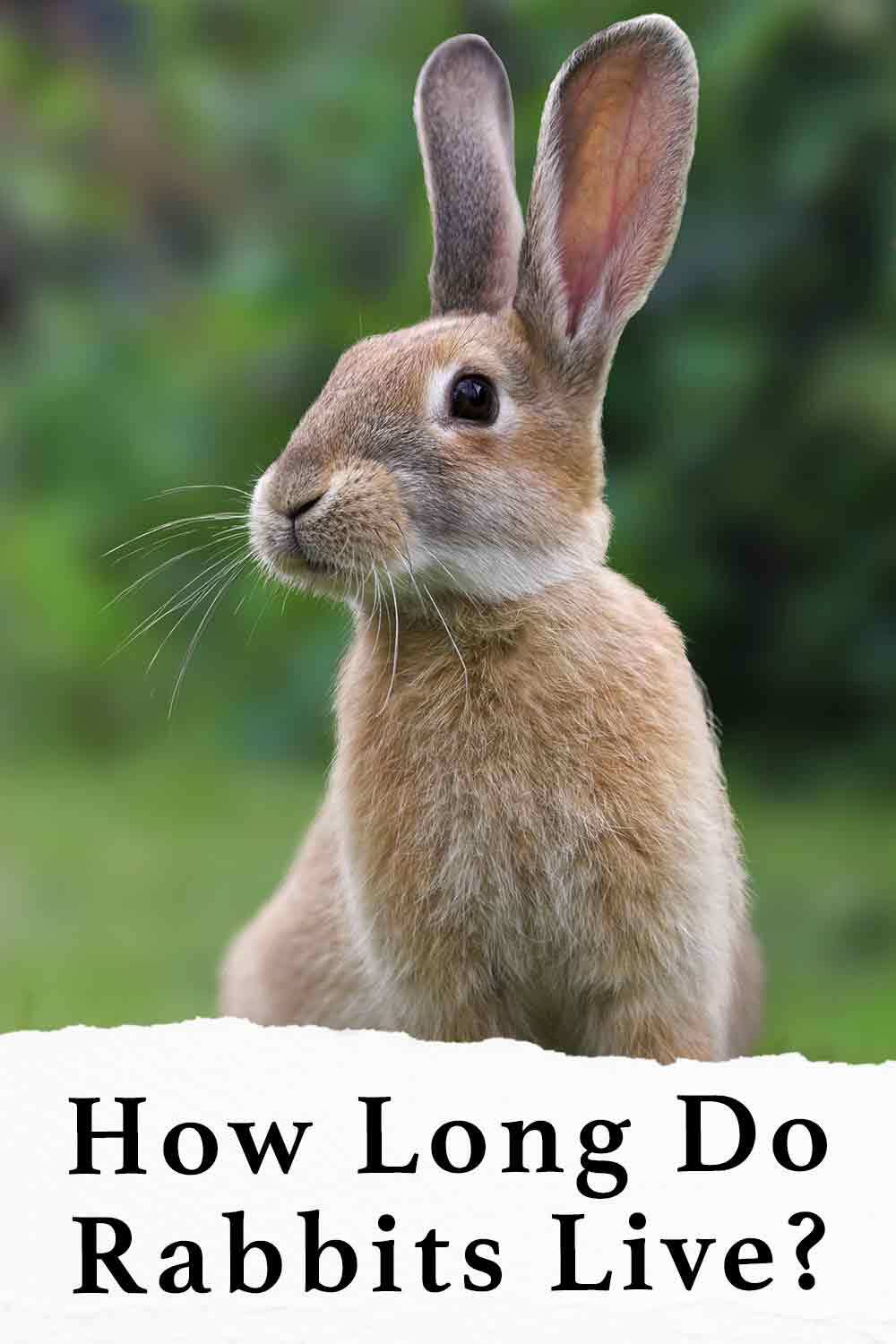
Rabbit Life Cycle
Litters of baby bunnies average around 3-5 kittens. The little ones are born blind, deaf, and without any fur. They remain in the nest for about three to four weeks, nursing on their mother. As the babies grow older, they will remain very social animals, living in families in the wild.
For domesticated rabbits, there is evidence to suggest that they live longer — and are likely happier — when they have a bunny buddy to live with. Rabbits reach sexual maturity at 3-6 months, depending on breed and circumstances.
How To Tell If Your Rabbit Is Getting Old
If you have an indoor bunny, you may expect to start seeing signs of aging around 4-5 years old.
Signs of aging include a decrease in activity level, and the onset of more health issues.
As your bunny gets older, she is likely to slow down considerably.
Factors Affecting Pet Rabbit Lifespan
One of the main factors affecting rabbit lifespan is living conditions.
Because rabbits are such tempting prey animals for many creatures, it really isn’t safe to keep your bunny outside 24 hours a day. The biggest risk to rabbits kept outside is predatory hunters.
If your rabbit lives in a hutch in the backyard, you are probably reducing its lifespan by at least half. So, if a domestic inside rabbit lives about eight years, you can expect your outdoor rabbit to live about four years.
There is simply not enough protection to keep your rabbit safe outside, as hutches or cages don’t provide enough of an obstacle at night. They are exposed to the elements and may not have much companionship or comfort out there. Also, rats and rodents can sneak in, introducing disease.
How Long Do Domestic Rabbits Live In The Wild?
There is also a higher possibility of escape if your pet lives outside, especially during handling or attacks by predators. Escaped domestic rabbits do not adapt to the wild. So their lifespan post-escape would not be very long at all.
Also, many of them have been bred with colors that do not blend with the natural environment, so they are easy targets for predators. Let’s take a look at the specific health problems that may influence the lifespan of your pet rabbit.
Pet Rabbit Lifespan And Overgrown Teeth
Your pet rabbit’s teeth will grow continuously throughout her life. To keep them a manageable length and to avoid the development of sharp edges, she needs to continually eat fiber to grind them down.
If her diet isn’t what it needs to be, she will get overgrown teeth. This causes pain, and your rabbit may not want to eat — or may not be able to eat at all.
Obviously, this has a serious impact on lifespan. This illustrates the importance of ensuring that your bunny has the proper diet. 80-90% of her diet should be fibrous, such as oats or grass.
Pet Rabbit Lifespan And Myxomatosis
Myxomatosis is a disease with symptoms including swelling and discharge from the eyes and nose. It is spread among rabbits from infected to uninfected, or can be spread by fleas and mosquitoes.
Myxomatosis is fatal to rabbits, and the best way to prevent it from drastically reducing your pet’s lifespan is by limiting exposure to mosquitoes and treating the rabbit for fleas.
Increasing Your Rabbit’s Life Span
Those of us who love buns know how sweet and sassy they are, and we want them to stay that way as long as possible.
There are things you can do to provide the optimal environment for your house rabbit. These are all ways to extend the average lifespan of a bunny!
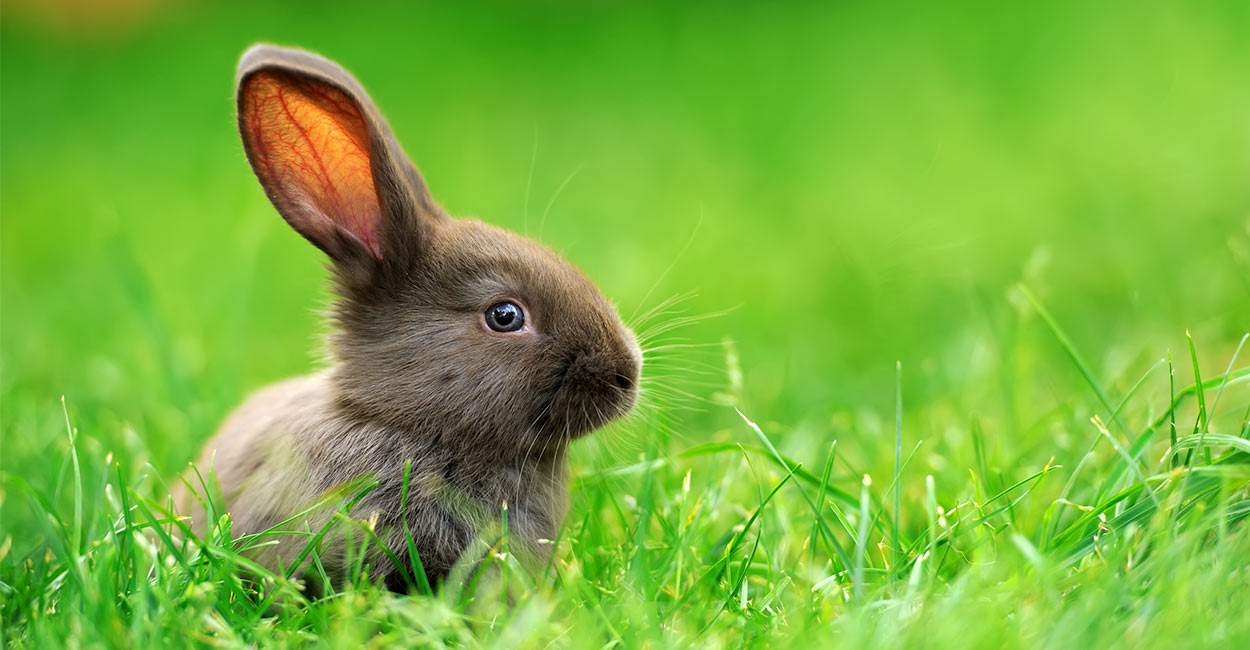
How Long Do Rabbits Live If Over Fed?
Diet is the most important aspect you can control if you want to keep your rabbit healthy. Make sure food is available to bunnies both night and day, as rabbits will drink and eat throughout a 24-hour period.
However, do not feed pellets to rabbits in an uncontrolled way. This can lead to obesity, heart and liver disease, chronic diarrhea, and kidney disease as a result of high carbohydrates, low fiber, and high calcium levels.
Don’t overfeed! Even large, 15 lb. bunnies don’t need more than 3/4 of a cup per day. Make sure commercially-made pellets are high in fiber, at 18% or more. You may wish to keep them refrigerated to prevent spoilage.
Bunny Diet Essentials
Timothy or another grass hay – not alfalfa hay – should be offered daily in unlimited amounts. It is important to keep it available at all times; withholding hay can lead to intestinal issues.
Hay should make up 80% of your rabbit’s diet. It promotes a healthy gut, maintains dental health, and provides nutrition.
Offer some fresh foods each day. A diverse array of green leafy vegetables is good, as are carrot tops, broccoli, pea pods, green peppers, basil, and brussels sprouts. One cup of fresh food per five lbs. of body weight each day is sufficient.
If you plan to add fruits and whole grain bread, these should be fed only in small amounts per day as treats.
Water should be offered in an inverted, mountable dispenser if possible, so that water remains clean.
Bunny Cages and Bedding
Rabbits should have access to clean straw litter, hay, shavings, or some type of dry, fibrous product as bedding. Cages without litter have been shown to cause health risks in rabbits.
Clean cages or hutches frequently. You should make sure rabbits have a quiet and peaceful living environment. Their living quarters should be able to act as a refuge or rest area, especially during the day, as most bunnies are mostly nocturnal.
If your bunny is inside, supervise her activity and “bunny-proof” her surroundings. Rabbits chew everything! Some of the things they chew, like electrical cords, can hurt them.
Also, rabbits should have regular exercise, mental enrichment with toys, and interaction with you. Consider getting a rabbit friend for your pet, since lone rabbits don’t live as long.
And don’t forget to take your vet for regular check-ups with the vet!
Temperature And Light
Keep temperature in mind. Rabbits keep a constant internal temperature. They modify their internal temperature with changes in how much they eat, their general body position, and breathing rate.
60-70° Fahrenheit is optimal. However, if the air temperature goes above about 95° F, they can no longer regulate their temperature and may get hyperthermia.
Rabbits are also sensitive to low humidity levels. Maintain a constant humidity level in their environment if possible. Hot spells with high humidity can cause discomfort and serious health problems in rabbits.
Rabbit habitats should also have good ventilation, to remove gases such as CO2 and the extra heat that rabbits give off.
Sunlight For Rabbits
Rabbits should get at least a few hours of sun per day. They don’t necessarily need it, but 8-16 hours a day of light seems to favor rabbit health.
But because rabbits are nocturnal, you don’t want to give them too much light for too long.
Proper Rabbit Handling
When you are handling your rabbit, support the hindquarters. Rabbits have fragile backbones, and these can snap if the hind legs are free to kick out.
Such an injury often results in euthanasia.
If you need to lift your bunny and you’re not used to it, do it near the floor so they don’t have far to jump.
Get Your Rabbits Spayed Or Neutered
The House Rabbit Society recommends spaying or neutering your bunnies in order to extend their lifespans.
Neutering a male rabbit can reduce aggression and territorial tendencies.
The leading cause of death in female rabbits is cancer of the uterus, which can be prevented by spaying.
How Long Do Dwarf Rabbits Live?
Dwarf rabbit breeds, which usually weigh between 2.5-3 lbs. and 3.5 lbs., live an average of 8-12 years when kept inside. With care, 10 years is a good average bunny lifespan.
Smaller rabbits tend to live on the longer end of the life expectancy range that includes all rabbits. Larger rabbits anecdotally live slightly shorter lives, but still fall into the same range.
Dwarf rabbits aren’t that different from larger breeds. They’re just smaller in size. They make great pets, though, because they are so little and cute.
How Long Do Lionhead Rabbits Live?
Lionhead rabbits are a relatively new breed; the British Rabbit Council recognized them in 2002, but the American Rabbit Breeders Association didn’t do so until 2014.
These are relatively small buns, weighing around 3 lbs. as adults. 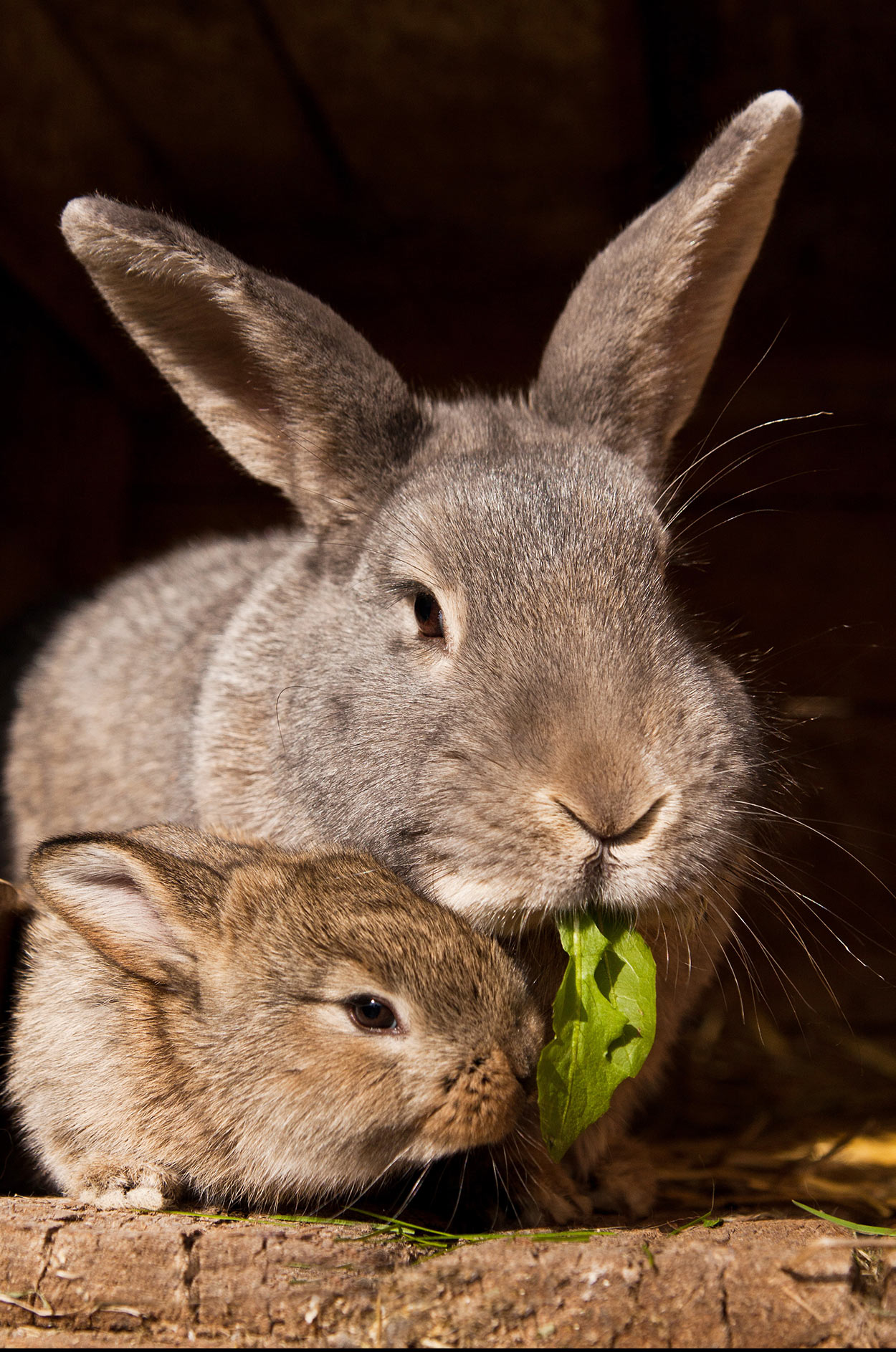
Left unattended, these manes can cause pain and lead to skin infections.
When properly cared for, lionhead rabbits can live from 8-10 years.
How Long Do Lop Rabbits Live?
Just so you know, there are several breeds of lops. These are the rabbits whose ears flop downward.
The different lop eared breeds range in size from 3-14 lbs, which is a big amount!
The French and English varieties are the largest. When you think of a lop eared rabbit you’re probably picturing the Holland lop, the Mini Lop, or the American Fuzzy Lop.
These are small dwarf rabbits with big heads, short bodies, and flattened faces. Lop eared rabbit life expectancy tends to be between 8-12 years.
How Long Do Rex Rabbits Live?
Rex bunnies, with their short ears, small heads and velvety coats, come in a medium size (7-11 lbs.) and a dwarf size (3-5 lbs.).
Like all rabbits, spayed and neutered Rexes can live between 8-12 years, based on genetics and quality of life.
How Long Do Dutch Rabbits Live?
Dutch rabbits are medium-sized rabbits, compactly built. Often, their markings include a white blaze on the face.
Rabbit lifespans, while they may be influenced by size, are not really dependent on breed. Dwarf rabbit life expectancy is about the same on average as other domestic rabbit life expectancy levels.
So you can expect your Dutch rabbit to live 8-12 years.
Oldest Living Rabbit
The Guinness Book of World Records lists the longest living rabbit ever as a rabbit named Flopsy.
Flopsy was caught wild in August 1964, and died almost 19 years later – 18 years and 10.75 months, to be exact. She lived in Tasmania, Australia.
More recently, the oldest living rabbit died in 2013 after living 17 years and two weeks. According to the Guinness Book of World Records, the rabbit named Do was a Jersey Woolly rabbit from New Jersey, born in 1996.
Do’s owner credits a strict diet, exercise, good genetics, and love for the longevity of her rabbit. She never got any fruits or vegetables or treats – just timothy hay and pellets.
Rabbit Lifespan Summary
How long do pet rabbits live? You can expect your pet bunny lifespan to be around 8-12 years.
She may start showing signs of age, such as a decrease in activity level and health issues, starting around 5 years.
With care, though, you can extend your bunny’s life, and make it a good one.
How Old Is Your Rabbit?
Do you have a rabbit? Let us know how old they are in the comments below!
References and Further Reading
- RSPCA. Advice and Welfare: Rabbits
- Brown, S. (1994). Working handout for clients. Midwest Bird and Exotic Animal Hospital.
- DeMello, M. (2016). Rabbits multiplying like rabbits: The rise in the worldwide popularity of rabbits as pets. Companion Animals in Everyday Life: Situating Human-Animal Engagement within Cultures.
- Lynch, K. (2013). My Story: Jenna Antol on owning Do, the world’s oldest living rabbit. Guinness World Records.
- Oldest rabbit (ever). Guinness World Records.
- Ramnaraine, A. (2017). Signs of aging. The House Rabbit Society.
- Ramnaraine, A. (2017). The importance of hay. The House Rabbit Society.
- F. Lebas (1997). The Rabbit – Husbandry, health, and production. FAO Animal Production and Health Series No. 21, Food and Agriculture Organization of the United Nations, Rome.
- Schepers, F. et al (2009). Welfare assessment in pet rabbits. Animal Welfare.
- Washington Department of Fish And Wildlife. Living with Wildlife: Rabbits.

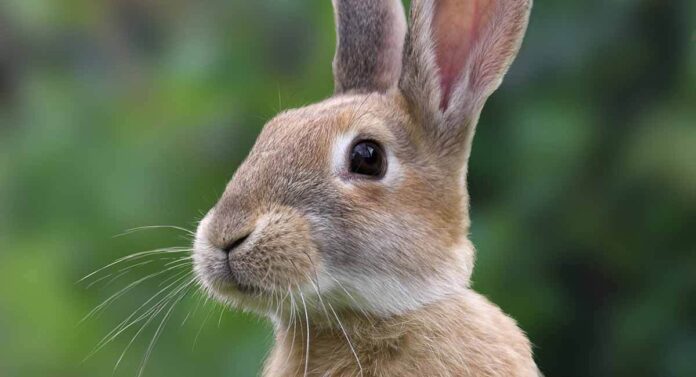
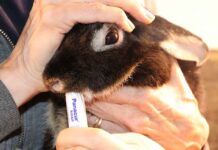

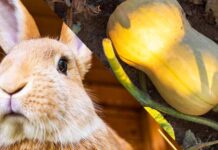










My beautiful dwarf lop lived 11 years and 3 months as a house bun. He deteriorated over a matter of weeks and regardless of intervention we couldnt get him well. Heartbroken and miss him every day.
I have 2 rescue mini lops that were 10 months old yesterday. Pom Pom and Buddy are siblings (neutered of course) and they absolutely love each other. they are free roaming and I can’t imagine being without them now 🙂
My two bunnies will be 11 in April.
Very interesting article. We are not sure of our rabbit’s age. We have had him for 7 years. We know he must have been outside at least two years prior and was not a tiny bunny when the original owners had him. He’s probably pushing 10 at this point. We love him!
My bunny is almost 14 years old! He belonged to a preschool where I taught for several years. When he started developing health issues I adopted him as the school was non-profit and was struggling to stay afloat due to Covid challenges. Brownie came to my home about 6 months before my dog of 14 years passed away. So God knew what He was doing when he brought Brownie into my life. He knew I would need someone to help my heart heal and that’s just what he is doing!
We had else for 10 years and she pass just before Easter we was heartbroken. My Daughter got her when she was five weeks old.She will be missed we had a lot of fun with her.Love you Elsa
We had our black/white medium bred bunny Hopper for six years. We got Hopper from another family who had him for two years. And before that he was a petting zoo bunny. We do not know his total age, somewhere between 8 and 10 years perhaps. He passed away yesterday, after struggling for at least a year. He broke a paw sometime during Covid by getting his paw wrapped up in a blanket trying to liberate himself. He learned how to hop around on three paws. But became weaker and weaker the last couple of months and stopped eating early this week. We kept him syringe fed with baby food and goat milk, and that lasted for a few days. In his younger days, he would hop up and down our couche like a bouncy ball. He particularly liked to pee into corners on the coach which mostly annoyed my wife greatly, but bunny pee has no offensive smell. Hopper had a real personality not unlike that of a dog. He would clap his paw to seek attention or voice his disapproval of something. One day, our dalmatian Dylan chased after Hopper, and Hopper courageously pummeled Dylan’s nose with his paws, ran around him and bit him in the tail. Dylan had his greatest respect for Hopper after that. My daughter got Hopper when she was eight and in second grade. She is 14 now graduating from middle school. He would go and explore the living room and occasionally disappear for hours and we would find him upstairs in the kids rooms, jumping up the stairs all by himself. In the winter, I liked to sit in front of the fireplace and read, and Hopper would come and sit on my lab, and we would share some peanut puffs, not very healthy, but he was so much after them. He was housed in the center of the house in the living room. Sometimes, we would wake up to strange noises thinking about burglars, and it was Hopper rustling around his cage. Hopper was the first the kids said good morning, and the last to say goodnight – every night. Yesterday, was the day we said the last time good night to him. Hopper will be missed very much and loved in our memories.
We have a lop-earred boy called Monty who is nearly 12. He lives in the lounge room and happily (I think) mooches around despite not seeing very well anymore. We’ve been saying ‘this’ll be his last birthday’ for a few years now, but he keeps on keeping on. He was a very handsome and healthy 3kg + in his prime, but has slimmed down to 1.6-ish at the last weigh-in and is looking a bit raggedy round the edges. He’s a lovely little man.